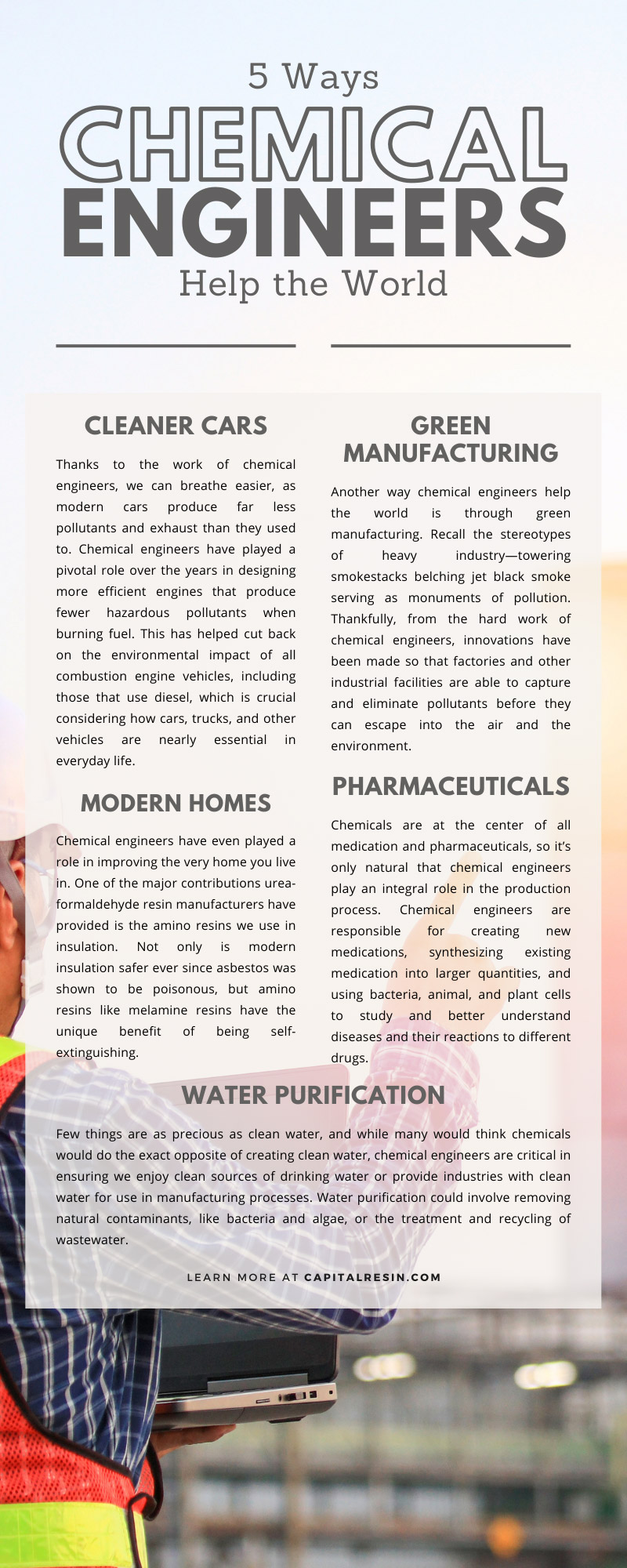Chemicals often get a bad rap, often getting demonized or feared simply because the average person doesn’t understand what chemicals are or how they affect our daily lives. In order to give you a better understanding of the chemical manufacturing industry and give the people working within the recognition they deserve, here are five ways chemical engineers help the world.
Cleaner Cars
Thanks to the work of chemical engineers, we can breathe easier, as modern cars produce far less pollutants and exhaust than they used to. Chemical engineers have played a pivotal role over the years in designing more efficient engines that produce fewer hazardous pollutants when burning fuel. This has helped cut back on the environmental impact of all combustion engine vehicles, including those that use diesel, which is crucial considering how cars, trucks, and other vehicles are nearly essential in everyday life.
Chemical engineers are accomplishing this by targeting the compressed natural gas released as a byproduct of burning fossil fuels. Some of the key developments devised by chemical engineers include:
- Engines with greater fuel efficiency and air management systems.
- Advancements in petroleum-refining techniques for a cleaner burn.
- Catalytic devices that destroy the pollutants in the exhaust of fuel-burning vehicles.
Such catalytic devices are the most intriguing and important of these contributions when it comes to air-pollution control. Quickly becoming a standard feature, these catalytic converters work to destroy the three main pollutants in engine exhaust: Unburned hydrocarbons (HC), carbon monoxide (CO), and nitrogen oxide (NOx).
The catalytic converter itself consists of a porous honeycomb ceramic base material that has been coated with a precious metal catalyst. This design allows contact with the pollutants to be maximized so that it has enough time to eliminate pollutants.
To give you an idea how significant the invention of the catalytic converter was, the inventors, chemical engineer John Mooney and chemist Carl Keith, were awarded the National Medal of Technology—the highest honor that can be given to innovation.
Green Manufacturing
Another way chemical engineers help the world is through green manufacturing. Recall the stereotypes of heavy industry—towering smokestacks belching jet black smoke serving as monuments of pollution. Thankfully, from the hard work of chemical engineers, innovations have been made so that factories and other industrial facilities are able to capture and eliminate pollutants before they can escape into the air and the environment. This has made industry and manufacturing a lot less impactful on the Earth, while preventing smog from choking the skies.
Modern technologies within industrial facilities now generate clean stack gas primarily consisting of steam rather than the old, disgusting, smokey flue gases of the past. As a result, airborne pollutants have been greatly reduced by eliminating emissions such as:
- Sulfur Dioxide (SO2)
- Nitrogen Oxides (NOx)
- Mercury
- Unburned hydrocarbons
Modern Homes
Chemical engineers have even played a role in improving the very home you live in. One of the major contributions urea-formaldehyde resin manufacturers have provided is the amino resins we use in insulation. Not only is modern insulation safer ever since asbestos was shown to be poisonous, but amino resins like melamine resins have the unique benefit of being self-extinguishing. As a result, you not only have incredibly effective insulation material, but material that is fire repellant makes it more difficult for fire to spread should one occur in your home.
Other materials that chemical engineers have created through amino resins include plywood, a material that has become integral to any structural application. The amino resins act as an adhesive for the thin layers of “plies” that make up a plank. This method of combining plies of wood together is more effective than traditional wooden planks because plywood has proven to endure a lot more stress and weather exposure than other forms of wooden materials.
Pharmaceuticals
Chemicals are at the center of all medication and pharmaceuticals, so it’s only natural that chemical engineers play an integral role in the production process. Chemical engineers are responsible for creating new medications, synthesizing existing medication into larger quantities, and using bacteria, animal, and plant cells to study and better understand diseases and their reactions to different drugs.
Without chemical engineers, we simply wouldn’t have any of the medications we take for granted in the modern era—especially vaccines that have eliminated or mitigated diseases such as smallpox and the flu.
Water Purification
Few things are as precious as clean water, and while many would think chemicals would do the exact opposite of creating clean water, chemical engineers are critical in ensuring we enjoy clean sources of drinking water or provide industries with clean water for use in manufacturing processes. Water purification could involve removing natural contaminants, like bacteria and algae, or the treatment and recycling of wastewater.
In recent history, the Earth’s population and the rate of industrial growth have quickly increased. This has created an increasing need for cost-effective water and wastewater purification processes. This is in order to provide everyone with a reliable source of drinking water and supply industries with the water they need to continue functioning and flourishing. Chemical engineers have devised new technologies over the years that are used to remove harmful pollutants from both raw sources of water and contaminated wastewater. As a result, chemical engineers have been key in developing cost-effective methods of accessing water, such as:
- Subsurface aquifers and surface sources, such as lakes and rivers, provide fresh potable drinking water.
- Producing purified water that meets strict demands and standards for both uses in industrial processes and ensures the health of people drinking the water.
- Treat contaminated industrial and municipal wastewater like sewage so that it’s safe enough to discharge to public waterways or be reused.
There is a wide array of technologies and processes that chemical engineers employ to purify water, involving physical, chemical, and biological techniques. This process of separating contaminants from the water is referred to as a “treatment train.” There are multiple steps in the treatment process, such as:
- Vacuum or pressure filtration
- Distillation
- Centrifugation
- Advanced oxidation treatments
- Membrane-based separation
With a better understanding of chemical engineers and the roles they play in our everyday lives, hopefully you now understand that chemicals are nothing to be to fear. Instead, they are the building blocks of everyday utilities and luxuries that have vastly improved our lives thanks to chemical engineers.








